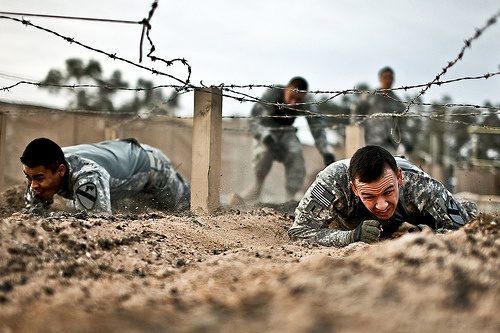 I’m grateful my children are reared, on their own, and doing well. I miss them and wish they weren’t so scattered so I could still share daily life with them. However, I’m grateful they’re thriving adults because parenting isn’t easy.
I’m grateful my children are reared, on their own, and doing well. I miss them and wish they weren’t so scattered so I could still share daily life with them. However, I’m grateful they’re thriving adults because parenting isn’t easy.
Today, life’s temptations are more alluring and more deadly today than they were just a few years ago. That reality leads me to pray for my children and their children faithfully, but it also raises questions about Proverbs 22:6, “Train up a child in the way he should go, And when he is old he will not depart from it.”
I know parents who sacrificed to rear godly children only to have them get swallowed up in the world. How do you train a child? How do you know the way he should go?What are the basics of training?
While studying my Sunday School lesson this past week, I just may have found the answer—a good start toward it anyway.
In John 16, Jesus is sharing His heart with His disciples in the Upper Room. They’ve eaten their final meal together before He is betrayed and hung on a cross. In this intimate setting, He’s trying to prepare them for life after He is gone, just as we seek to prepare our children for life without us.
In chapters 13 through 15, Jesus repeated some basic tenants several themes. It’s clear that He really wants His disciples to understand what He’s telling them.
Then, in the first verse of chapter 16, He said, “”These things I have spoken to you, that you should not be made to stumble.”
He knew that when tribulation came, His disciples might stumble if their faith wasn’t strong—and they would face a crisis very quickly. Consequently, He shared the truths that would strengthen their faith, girding them up so they won’t trip when trouble comes.
Bingo. That’s what I want for my children and grandchildren. And for yours too. Too many of our young people are stumbling when they leave the nest and face adversity. Too many are tripped up by the world.
Many adults are stumbling these days too. We all need our faith strengthened, just as the disciples did. In chapters 15 and 16, Jesus states that the world will hate those who follow Him, so we can count on adversity. We need to be prepared, because it will come in some form.
Jesus gives foundational principles that His disciples need in order to maintain a strong faith. I’ll try to be brief as I list some of the topics Jesus focused on as He bid His disciples good-bye. Most of these were repeated several times.
Chapter 13:
- Jesus washed the disciples’ feet and told them to serve one another as He served them–sacrificially, in humidity (13:3-17).
- Jesus told His disciples to love one another (13:31-35,15:17) “as I loved you” (15:10, 12)
Chapter 14:
- Jesus prepared them for His departure and said He was going to prepare a place for them to come to Him (preparation for difficult time included reason for his leaving and a reason for hope) (14:2-3, 28)
- Jesus is the way, truth, and life, the only way to the Father (14:6). That’s foundational knowledge for any time we’re confused, or feel lost or lack purpose.
- Jesus is in the Father and the Father in Him. If we dwell in Him we will do greater works than He did. (14:9-11)
- If we ask anything “in His Name” He will do it. (14:12-14,15:16) (“In His name” is covenant talk. For greater understanding of what it means, read The Great Exchange: Bound by Blood.)
- Jesus will send the Helper/Comforter/Holy Spirit to abide with us, guide us, and help us walk in righteousness (14:16, 26, 15:26).
- He will manifest Himself to those who love and obey Him. (14:21) Indeed, He will make His abode with them (14:23).
Chapter 15
- Jesus is the vine, we are branches. If we abide in Him, we will be fruitful. Without Him, we can do nothing (15:1-8).
- If we obey His commands, we will be Jesus’ friends (15:14).
- The world will hate us because it hates Jesus, and He called us out of the world (15:18-21) (Isn’t it nice to be reassured that the problem may not be that we caused offense?)
- Even though the world hates and persecutes us, we are to bear witness to them of Jesus (15:27). (After all, the reason they hate is because they do not know the Father [15:21].)
In summary, what keeps us from stumbling? Our relationships are key.
- Our relationship with Jesus and with our heavenly Father:
- Love Him and obey His commandments
- Abide/live in Him. Stay connected to the vine, and thus bear fruit.
- Seek Jesus. He is the way, truth, and life. When in need, run to Him—He has covenanted to care for our needs.
- Listen for the Holy Spirit’s guidance and partake of the help He offers.
- Our relationships with each other. We need to:
- Love one another as Jesus loves us.
- Serve one another. In humility laying down our lives in sacrifice to each other (in daily service, not just being willing to die.)
- Our relationship with the world
- Expect contempt and hatred.
- Bear witness to Jesus’ love and life so they will know Him and He will receive glory.
Simple. For someone who has grown up in the church, these are all familiar tenants. There are no surprises—either for us personally or for how we need to train our children.
And yet, we too are easily influenced and distracted by the world, making it hard to consistently follow through. In truth, we can’t do it alone because it isn’t natural to our fallen nature.
That’s probably why Jesus repeated them so much and why all these points focus on relationships, beginning with our relationship with God.
If, as we train our children—and ourselves—we keep our focus and priority on developing our relationship with God, we probably won’t have to worry about stumbling. After all, if that bond is strong, we will be holding His hand, and He will see us through.
 en children are older and all those lessons are past. Parents of pre-teens and teens long for the days when instruction was as simple as in toddler days.
en children are older and all those lessons are past. Parents of pre-teens and teens long for the days when instruction was as simple as in toddler days.